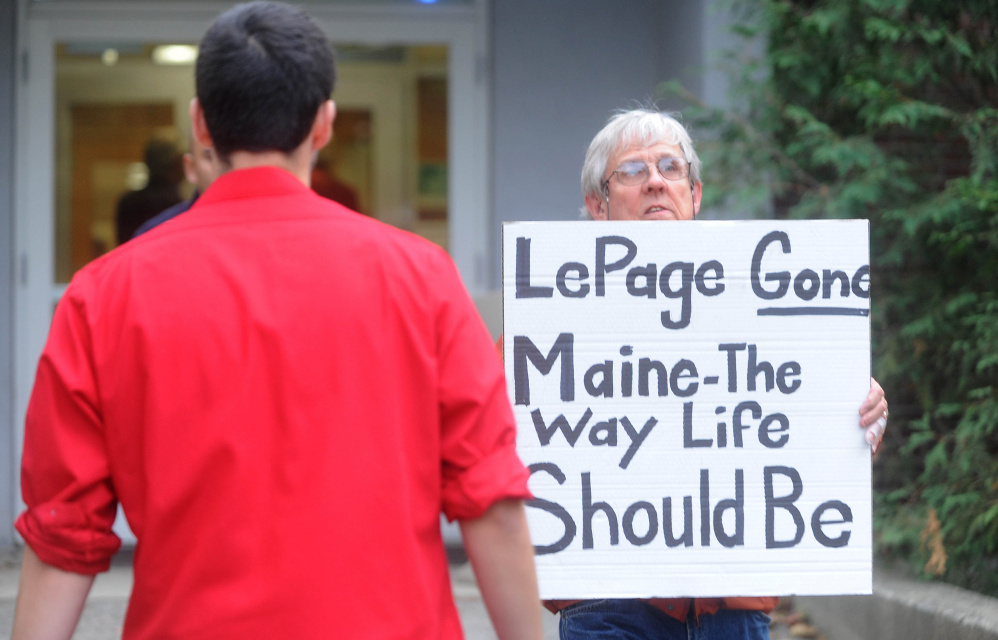FARMINGTON — Gov. Paul LePage at a public town meeting Tuesday night in Farmington reaffirmed his assertion that he will lead the effort for a 2016 ballot initiative that would seek to eliminate the state’s income tax.
Reforming the state’s tax system was the primary point in what he called his “vision for Maine,” but LePage also stressed the importance he believes welfare reform, lowering energy costs and the reduction of student debt will play in Maine’s future prosperity at the first of what he said will be weekly town hall-style meetings.
“In Augusta, I’m the bad guy because I’m trying to lower the taxes so that it can stay in your pockets, and that it can stay in the Maine people’s pocket and they can spend it the way they choose to spend it,” he told a full crowd in the University of Maine at Farmington’s Thomas Auditorium. “(But) I think that’s the American way. I believe in smaller government, individual rights and keep what you earn.”
The meeting was the governor’s first since a Lisbon meeting in June, but LePage said that he will hold a town hall meeting every week leading up to the 2016 elections to stress to voters that they need to be selecting legislators who “care about the future of Maine.”
LePage spoke for the first thirty minutes of the meeting, outlining the four points of vision for Maine’s future, and then responded to audience questions for the last half hour, which remained civil and orderly.
“I ask you this when you go to the polls in ’16. … I don’t care if they’re independent, if they’re liberal, if they’re Democrat, Republican, conservative, libertarian. I don’t care what their affiliation is, but I do ask you this: Elect people that are fiscally responsible with a little bit of common sense that won’t use ideology to stunt progress, and that’s what we’re doing to the state of Maine,” LePage said.
LePage’s focus on the state’s income tax, which he said was at the root of the state’s fiscal problems, was well received by the crowd. At present the state income tax is 7.1 percent, compared to the national average of 5.5 percent. In June, the Legislature didn’t pass LePage’s proposed state budget, which would have lowered the income tax to 5.75 percent.
Monday LePage told the Maine Public Broadcasting Network that he will not participate in the legislative process. By proposing a ballot initiative to eliminate the income tax, he will bypass the Legislature by going straight to the voters.
To support the elimination of Maine’s income tax, he cited states such as New Hampshire, Florida and Nevada, where he said many Mainers choose to spend more than six months of the year because those states lack an income tax.
“Maine is a poor state. It’s poor because we overtax our middle class … and then those who retire with the little nest egg have to leave the state and go to Florida or other states to avoid the death tax,” LePage said.
LePage assured the crowd that no benefits would be cut to make up for the annual $3 billion loss in revenue that would come from eliminating the income tax. Rather, the state would increase its sales tax to tap into the summer revenue from tourists as well as practice “efficient” spending when it comes to welfare programs.
Reform of the state’s welfare system was another point of LePage’s vision, though he did not specifically map out any plans for program reform. He reacted to claims that he has not been a “compassionate governor,” stating that he is compassionate for the elderly, the disabled and the mentality ill, but said, “I am not going to help just anybody for the sake of helping. I am not that compassionate.”
However, college students were among the group of Mainers that LePage seems willing to help, as he argued that the rising cost of education and student debt is aiding in aging the state by forcing college graduates to leave Maine in order to find jobs and a sustainable standard of living.
He criticized the Legislature for rejecting a bill of his that proposed interest-free loans as well as a “dollar for dollar” tax credit that would be eligible to any business that assisted in the payment of their employee’s student loans. “I feel really bad for the young people of this state,” LePage said. “All I’m trying to do is compete, (to) attract younger people to (Maine) to have jobs. Maine can have jobs.”
LePage also stressed cutting energy costs in order to keep manufacturing companies in Maine. He cited high energy costs as one of the primary reasons Maine’s mills have been closing over recent decades and believes the focus of the energy debate is too often shifted towards wind and solar, when in Maine he believes natural gas and cost effective heat pumps would be a better fit for the state.
“Wind and solar are good boutique businesses. I think it’s great if you can afford it, but in a state like Maine you need a backup,” LePage said. “Natural gas is a fossil fuel, and yes, it has emissions, but it’s half as much as oil, it’s much more efficient and cleaner, and while I do not believe it is the end of the world by using it, I think it’s a stopgap energy. In the next 25 years, we need to have that energy and we need to be using natural gas. Otherwise we’re going to lose the best companies we have.”
Neither LePage nor his press secretary, Adrienne Bennett, disclosed the location or date of his next town hall meeting.
Lauren Abbate — 861-9252
Twitter: @Lauren_M_Abbate
Copy the Story Link
Send questions/comments to the editors.





Success. Please wait for the page to reload. If the page does not reload within 5 seconds, please refresh the page.
Enter your email and password to access comments.
Hi, to comment on stories you must . This profile is in addition to your subscription and website login.
Already have a commenting profile? .
Invalid username/password.
Please check your email to confirm and complete your registration.
Only subscribers are eligible to post comments. Please subscribe or login first for digital access. Here’s why.
Use the form below to reset your password. When you've submitted your account email, we will send an email with a reset code.